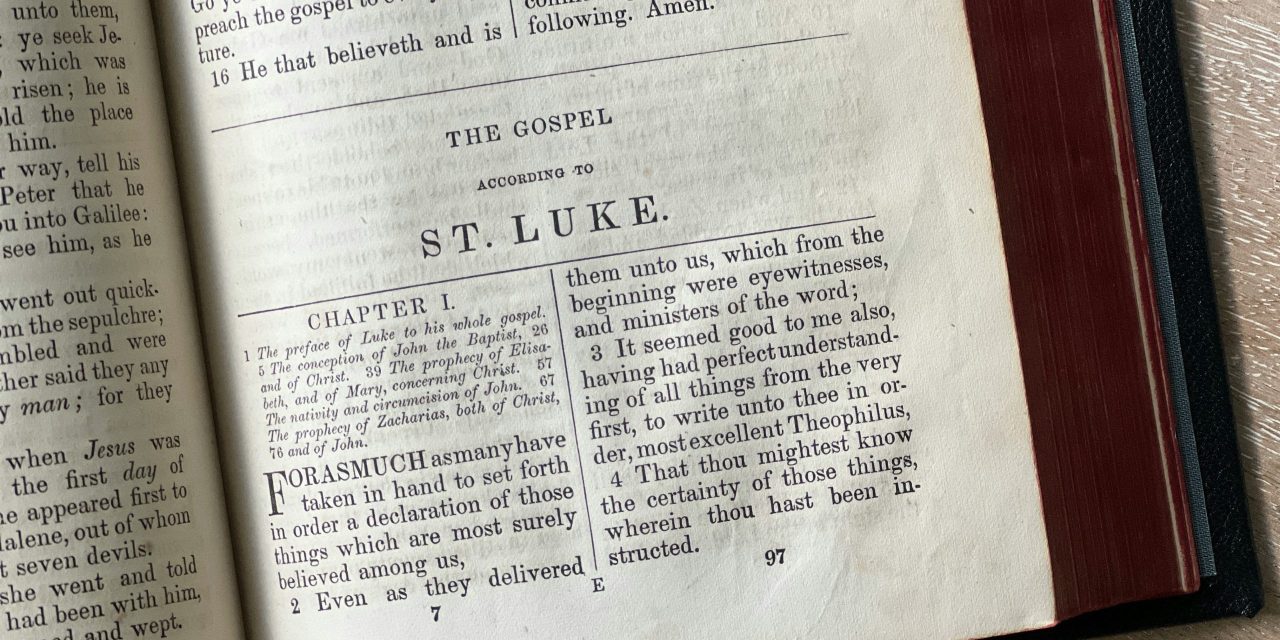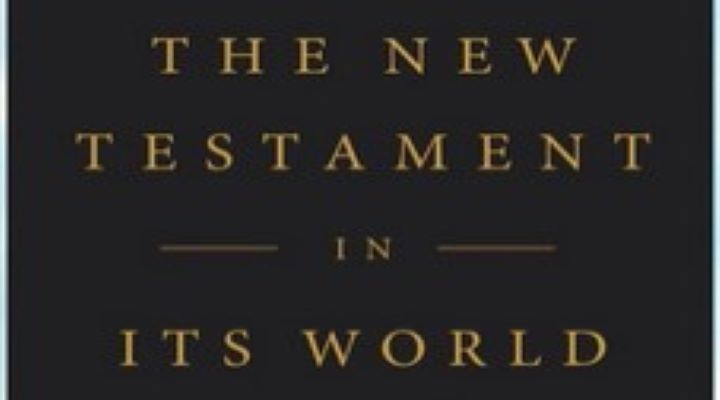In the mid-second century, a heretic named Marcion tried to play cut and paste with the Bible. He unhitched from the Old Testament and even scalpeled the Gospel of Luke to suit his theology. This led to an interesting little document being written in response—a prologue to Luke’s Gospel from around A.D. 150. While this work is not Scripture, and probably includes a mix of history and tradition, it’s close enough to Luke’s lifetime to be worth considering.
Here’s what it says: “Luke was an Antiochian of Syria, a physician by profession. He was a disciple of the apostles and later accompanied Paul until the latter’s martyrdom. He served the Lord without [blame], having neither wife nor children, and at the age of eighty-four he fell asleep in Boeotia [in Greece], full of the Holy Spirit.”
I want to take some time in this post to reflect on the life of Luke. He’s not just the author of a Gospel and the book of Acts—he’s an example worth imitating (cf. Phil 3:17). He shows us what it looks like to use your gifts, your time, and your life in service to the Kingdom of Christ.
Luke’s Greek
One thing is crystal clear about Luke: the man was a writer. R.C. Sproul said of him, “His mastery of language and artistry with words reveal that he was an educated man.” Luke’s Greek is refined, precise, and beautiful.
I am in agreement with those who believe Luke was a Gentile. Colossians 4 gives us good reason to think so, since Paul seems to separate Luke from his Jewish companions (cf. 4:11, 14). Luke likely spoke Greek as his first language and may have been from Antioch.
Luke’s Gospel and Acts, taken together, make up more of the New Testament (by word count) than any other author—including Paul. Luke may not have written the most books, but he wrote the most words—more than 27% of the New Testament.
Even if you give Paul Hebrews, Luke still has him beat. And if you give Luke Hebrews, will, it only adds to his prolificity. Even without Hebrews, if Acts and Luke were one book, it would be the longest book of the entire Bible by word count beating Jeremiah by some 4,000 words.
The New Testament’s most prolific writer was a Gentile. Fascinating.
Luke’s Gifts
Luke was talented. And what’s more, he put his talents to work for the Kingdom. Paul calls him “the beloved physician” in Colossians 4:14. That tells us something about Luke’s profession and his relationship with Paul—but it also reminds us that our work matters and I would encourage every reader to consider how to leverage our profession for the kingdom.
Luke was also a historian. Darrell Bock, a New Testament scholar, says Luke is “a first-class ancient historian.” Luke researched, interviewed, investigated, and compiled. He wasn’t an eyewitness to everything he wrote about, but he was thorough, accurate, and Spirit led.
God’s inspiration doesn’t mean Luke turned into a robot. He wasn’t put in a trance. He studied, listened, asked questions, and wrote it all down. Yet, the Holy Spirit ensured every word was infallible, inerrant, sufficient, clear, necessary, and authoritative.
But of all Luke’s gifts, the greatest wasn’t medical knowledge or writing talent. It was grace. We don’t know exactly when Luke became a Christian. There’s no testimony story in Scripture about his conversion. But we do know that God gave him the gift of repentance.
Acts 11:18 tells us plainly that God grants repentance. That’s not about Luke specifically, but it is a truth that applies to all who come to Christ. Repentance is a gift. You don’t come up with it yourself. It’s not self-help. It’s grace.
Across Luke and Acts (52 chapters total) Luke uses the words repent, repentance, or turn 28 times. This theme saturated his theology and ministry. Repentance isn’t optional. It’s not a suggestion. It’s a divine demand.
The message of the gospel is clear: We were made in God’s image, but we’ve rebelled. We’ve broken His Law. We’ve chosen sin over holiness and self over God. But 2,000 years ago, Jesus came to us, truly God, truly man. He lived the righteous life we never could or would, then died in our place. On the cross, the sinless One was treated as if He were the sinner, suffering under God’s wrath. And on the third day, He rose.
That gospel demands a response: Repent and believe.
Here’s another gift Luke had. He was a gospel preacher. In 2 Corinthians 8:18, Paul mentions sending “the brother who is famous among all the churches for his preaching of the gospel.” Some believe that was Luke. We can’t be certain, but we do know Luke preached.
Acts 16:10 marks a turning point. Luke starts using the word “we” instead of “they.” He joins Paul, Silas, and Timothy as they head into Macedonia. Their goal? Not setting up a clinic. Not launching a relief effort. They were going to preach the gospel.
Luke’s ultimate mission wasn’t medicine. It was the message. He was a gospel man.
We should be clear on this: there may be many things you could place under the banner of missions and evangelism, but none takes priority over the preaching of the gospel.
The gifts continue: Luke was a theologian who arranged his material to show us the glory of Christ.
He traced Jesus’ lineage all the way back to Adam, showing that Jesus is the second Adam. The Last Adam we need to represent us. He recorded Jesus’ words on the road to Emmaus, where the risen Lord explains that the whole Old Testament points to Him. And in Acts, he shows how the apostles’ preaching flowed out of the Scriptures. Over and over, Luke paints a clear picture: Christ is the fulfillment of God’s promises. He is the King. He is the Lord. He is the One the whole story is about.
Another gift. Was Luke a pastor? I think it’s probable. In Acts 16:10, he joins Paul and company. By Acts 16:40, he switches the pronouns to third person, implying he remains in Philippi. By Acts 20:5-6—several years later—he still seems to be there. That’s maybe a 7-year stretch.
What was he doing?
It’s not spelled out, but it seems likely to me that Luke was helping establish the young church in Philippi. Perhaps even serving in a pastoral role (some believe Paul is referring to Luke in Philippians 4:3).
Luke’s Godliness
Luke’s character shines in three areas worth emulating:
- Love for Scripture: Luke knew the Old Testament deeply, seeing Christ in its pages. His example urges us to study, memorize, and meditate on God’s Word. Spiritual growth doesn’t come by osmosis but through disciplined engagement with Scripture.
- Love for the Church: Luke cherished God’s people. Acts details the church’s joys—fellowship, baptisms—and struggles—conflict, persecution. Yet, he never wavered, recording Paul’s words that God purchased the church with His blood (Acts 20:28). His whole point was to show us that the kingdom of Christ prevails. Give your life to the cause of the local church.
- Loyal Friendship: Luke stood by Paul through riots, arrests, and shipwrecks. In 2 Timothy 4:11, Paul writes, “Only Luke is with me,” as others deserted him. Luke’s loyalty challenges us to be faithful friends, even when it’s costly. We all want such companions—more importantly, we should strive to be them. What if your godly friendship challenged those around you to be more bold for Christ?
A Life Well Lived
Luke’s life offers several practical lessons. First, for those yet to follow Christ, heed Jesus’ words: “Those who are well have no need of a physician, but those who are sick. I have not come to call the righteous but sinners to repentance.” (Luke 5:31-32). Acknowledge your sin, trust in His atoning sacrifice, look to His resurrection by faith, and find forgiveness. Luke was the physician who could heal your body. But Jesus is the physician who heals souls. Go to Him.
For Christians, Luke’s no superhero. He’s just a faithful believer. God used him uniquely, but He can use us, too. Luke 12:31-32 promises that God will give His people the kingdom. This should shape our priorities including our time, resources, and conversations. Like Luke, we can share Christ wherever we are, whether at work, home, or with neighbors. Don’t wait for others to speak up; take the gospel to those God has placed in your life. Luke also cared for the marginalized—tax collectors, widows, children. Who’s overlooked in your world? They need Christ!
Like Luke, we must also give ourselves to the local church. Luke was a churchman. We need more churchmen in these days. In fact, these are the type of men you should follow in this trying times. Churchmen. Be one. And follow such.
Also, don’t fear obscurity. If you were to list your top 5 favorite people from the New Testament, I bet you wouldn’t have thought of Luke before this post. Luke never sought fame, yet his quiet faithfulness impacted the church. He served without fanfare, content to lift up Christ. You don’t have to be known to be used by God. He knows you! That is enough.
When Luke died at age 84 (if tradition is right), he left a legacy of devotion to the kingdom. He never saw Jesus in the flesh, but when he closed his eyes, he beheld Christ’s glory in a way we cannot yet imagine. His life was spent for Christ’s glory. And a life spent for such is a life without regret.
Luke’s story challenges us to ask: Are we keeping our eyes on men like this? Are we imitating them? Are we using our gifts for God? Do we treasure His Word and His church? Are we faithful in friendship? May we, like Luke, live for Christ, trusting that our labor for His kingdom is never in vain.






Robert, thank you very much for the kind words, brother. That sincerely means a lot to me that your spirit…